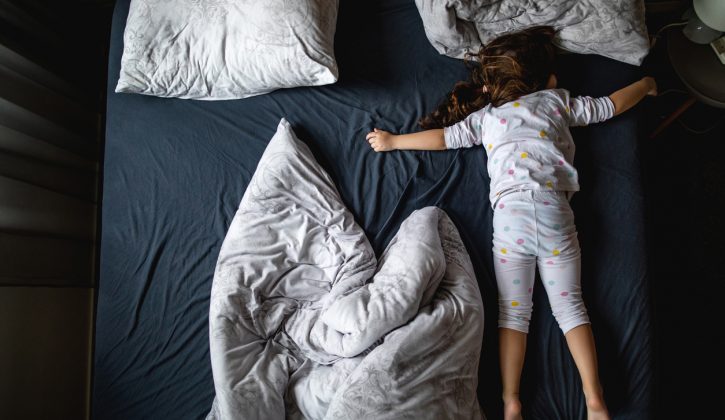Whether you’re parenting a toddler, a big kid, a tween, or a teenager (or a combination … lucky you!) you’ve probably wondered about your child’s sleep habits: Are they getting enough? What’s normal for a kid this age? Is my teenager sleeping too much? Is there such a thing as too much sleep? How can we cope with time changes like falling back and springing forward?
Sleep is such a critical part of child development, everyday happiness, and basic human functioning that it’s no wonder most of us are fixated on it, especially when it comes to our kids. We may have kissed regular, restful sleep goodbye years ago, but we know we have to be vigilant when it comes to our kids. After all, hell hath no fury like a tired child.
Children’s sleep habits are a well-worn topic in the parenting space. But how do you separate fact from fiction and sort through all the opinions and advice? It’s always best to discuss your child’s health with her doctor, but in the meantime, we’ve sourced some credible, expert information to give you general guidelines as to how much sleep your child needs.
How Much Sleep Does My Child Need by Age & Stage:
Toddlers & Children
The Canadian Paediatric Society (CPS)’s guide to the amount of sleep young children need notes that, including naps, children aged one to three need 10 to 13 hours, and those aged three to 10, need 10 to 12 hours each 24-hour cycle.
The National Sleep Foundation (NSF)’s guidelines are slightly different (likely because they don’t account for naps), recommending nine to 11 hours of sleep per night for children age six to 13. Similarly, the American Academy of Pediatrics (AAP) recommends children six to 12 sleep nine to 12 hours per 24 hours.
The bottom line: children under 10 (excluding infants) should be sleeping a minimum of nine hours per night.
The CPS further suggests that, for toddlers and preschoolers, “a consistent, calming bedtime routine, ideally carried out in the child’s bedroom and definitely not involving electronic screens” is essential for optimal sleep. As well, “being active during the day and after dinner—but preferably not within a couple of hours of bedtime—helps children sleep better at night.”
Tweens & Teens
For teens aged 13-18, both the AAP and CPC recommend eight to 10 hours of sleep per night.
However, a recent CBC Health Report called lack of sleep an ‘epidemic’ among Canadian teens – one that’s led many health care professionals to raise the alarm about the long-term consequences of sleep deprivation.
Homework, social lives, and late-night use of technology aside, teenagers’ sleep habits suffer for biological reasons too. The same report noted that, in addition to changing hormones, teens’ internal clocks actually shift during adolescence and puberty, which means melatonin (the sleep-inducing hormone) starts peaking later, beginning at roughly 11 pm. In other words, they may not be able to help staying up late.
Why is sleep so important?
According to the CPS, poor or lack of sleep can negatively impact cognition, emotion, and function. Sick Kids Hospital in Toronto further notes that lack of sleep among children “causes irritability, increased stress, forgetfulness, difficulties with learning, and low motivation” and “over time … can contribute to anxiety and depression.” Not to mention a fact that’s all-too-familiar to most of us: when the kids aren’t sleeping well, neither are the adults and family function suffers.
For teens, a lack of sleep has been linked to obesity, diabetes, depression, and substance abuse. But that sounds like a pretty big leap. Surely lack of sleep can’t be that big a deal? There must be other factors present for these problems to manifest?
While physical inactivity and genetics might also play a significant role in the development of these conditions, sleep’s role cannot be ignored. An online search for resources linking sleep with obesity, diabetes, depression and substance abuse reveals thousands of scholarly articles and journals relating to the subject, including a report published in the American Journal of Health Behavior that concluded “Weekday sleep duration appears to be protective for substance use, depression and school truancy for teenagers”, and another published by the Sleep Research Society that found “a consistent increased risk of obesity amongst short sleepers in children and adults.”
So How Much Sleep Does My Child Need?
The bottom line: sleep plays a critical role in the optimal development and functioning of children and youth. If your child isn’t getting enough sleep on a regular, consistent basis, intervention is probably in order.
Talk to your doctor or pediatrician about how to develop good habits. He or she can help you rule out anything that might be going on medically or emotionally to prevent your child from getting enough rest and refer you to a specialist if needed.
Tagged under: sleep,kids sleeping,how much sleep does my child need,teenagers and sleep,why isn't my kid sleeping,kids and sleep,toddlers and sleep,tweens and sleep,is my teenager getting enough sleep,is my kid getting enough sleep,what do experts say about kids and sleep
Category: health






